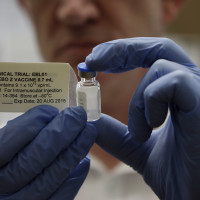
GAVI, the global vaccine alliance, has pledged to donate $5 million toward developing the leading Ebola vaccine in the hope it will be approved by a regulator by the end of 2017.
If the vaccine is given the green light, GAVI says it will then create a stockpile to help stamp out future outbreaks of the deadly disease. The vaccine’s producer, Merck & Co. Inc., says it will ensure that 300,000 doses are available from May 2016 for use in expanded use clinical trials and/or for emergency use as needed while vaccine development continues.
In a statement on Wednesday, GAVI CEO Dr Seth Berkley said “the world is still worryingly underprepared for potential future health threats.”
The agreement, announced on January 20th at the World Economic Forum in Davos, will help Merck take the vaccine through licensure and World Health Organization (WHO) prequalification.
Merck has already submitted an application through WHO’s Emergency Use Assessment and Listing (EUAL) procedure. If the EUAL is approved, this will provide an opportunity for the investigational vaccine to be used if another public health emergency with Ebola occurs before the vaccine is licensed.
Dr Julie Gerberding, executive vice president, Strategic Communications, Global Public Policy and Population Health for Merck said: “We are very pleased to join with GAVI in announcing this Advance Purchase Commitment agreement to support the provision of MSD’s investigational monovalent Ebola Zaire vaccine – in case of a resurgence of the Ebola outbreak or a new outbreak.
“We applaud GAVI for this bold step to be a part of the solution to address a disease that has impacted so many lives.”
More than 11,000 people died and almost 29,000 were infected in the latest outbreak in West Africa. The sheer scale of the outbreak – the largest in history – led to an unprecedented push on vaccines, which condensed a decade’s work into less than a year.
The epidemic also had a devastating impact on the health systems with disruptive effects on childhood immunisation programmes. It is estimated that coverage rates for the basic DTP (diphtheria, tetanus and pertussis – or whooping cough) vaccine dropped by about 30% in both 2014 and 2015 compared with 2013. This has resulted in several outbreaks of vaccine-preventable diseases and loss of confidence in the healthcare system.
Merck has led trials of the VSV-EBOV vaccine – which combines a fragment of the Ebola virus with another safer virus in order to train the immune system to beat Ebola. Early evidence from studies in West Africa suggest it may give 100% protection, although more data is still being collected.
Dr Berkley said: “The suffering caused by the Ebola crisis was a wake-up call to many in the global health community.
“New threats require smart solutions, and our innovative financing agreement with Merck will ensure that we are ahead of the curve for future Ebola outbreaks.”
On 14 January, WHO announced that no new Ebola cases had been reported in the three worst affected countries in the preceding 42 days. However, shortly following the announcement, which included a warning that sporadic flare-ups could occur, Sierra Leone reported an Ebola-related death.
“The most recent Ebola-related death in Sierra Leone and the fact that we know the reservoirs of Ebola still exist, underline why we must learn lessons from the devastating impact of the crisis and ensure we are better prepared for infectious disease outbreaks. The world is still worryingly underprepared for potential future health threats and a change of mindset is required to ensure we invest in research and development today to protect ourselves in years to come,” added Dr Berkley
GAVI’s flexible country-tailored approach has enabled the affected countries to not only reach those children who missed their routine vaccines but also to strengthen national efforts on routine immunisation programmes as a key element of the primary health care system.
Ebola outbreaks have mainly affected rural areas in the poorest developing countries and have been brought under control quickly by local authorities. This means the development of Ebola vaccines has been a lower priority compared to other vaccines.
“Ensuring a vaccine will be available to protect people who might have missed out due to a market failure lies at the heart of what makes GAVI so important in global health,” said GAVI Board Chair Dr Ngozi Okonjo-Iweala. “It is our moral duty to ensure that people do not miss out simply because of where they are born or whether they can afford to pay.”
In December 2014, the GAVI Board committed significant funding for the purchase of Ebola vaccines, once approved. At GAVI’s replenishment conference, held in January 2015, Dr Jacques Cholat, President of Merck Vaccines, announced the company’s commitment to provide its Ebola vaccine to the world’s poorest countries at the lowest possible, not-for-profit access price when it becomes fully licensed.
Dr Jeremy Farrar, the director of the Wellcome Trust medical research charity, said VSV-EBOV had shown “remarkable results” and was one of the “few positive outcomes” to emerge from the epidemic.
He said: “As we saw with the new confirmed case just last week, the Ebola epidemic is likely to have a long tail and it’s possible that several more isolated cases will emerge in the coming weeks and months.
“This vaccine, therefore, could still play an important role in containing any additional flare-ups of this outbreak, as well as being available to help prevent future epidemics.”
GAVI, the Vaccine Alliance is a public-private global health partnership committed to increasing access to immunisation in poor countries. It brings together developing country and donor governments, the World Health Organization, UNICEF, the World Bank, the vaccine industry in both industrialised and developing countries, research and technical agencies, civil society and private philanthropists led by the Bill & Melinda Gates Foundation.










